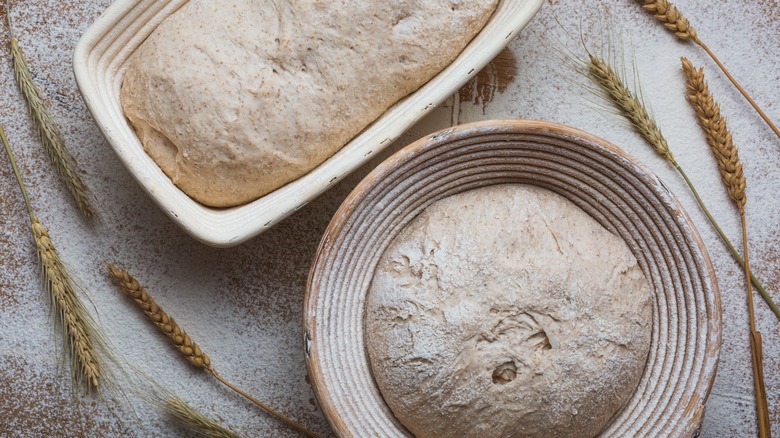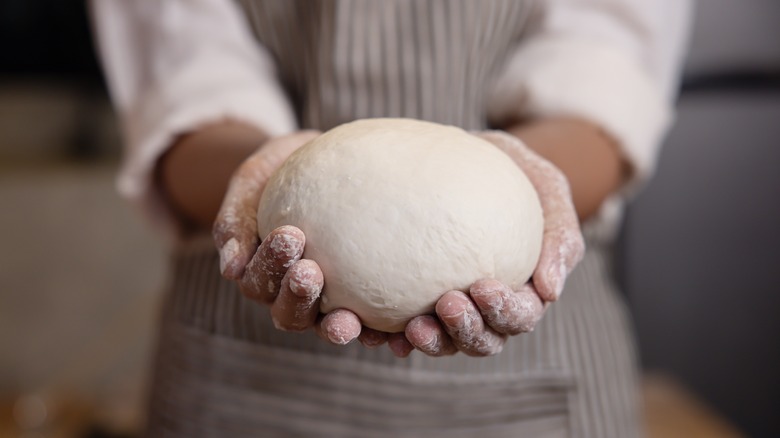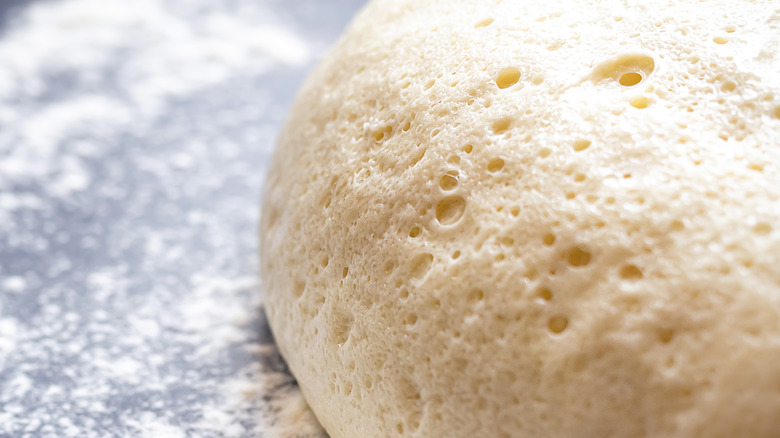Why Cold Bulk Fermentation Makes More Flavorful Bread
Breanne Kostyk makes fantastic bagels. Her New Orleans-based bagel shop, Flour Moon Bagels, has received national attention, as her bagels rival the best bagels New York has to offer — the highest compliment a bagel can receive. What's her secret? Every part of the process is important, but Kostyk says that cold fermentation is key to complex flavor. At Flour Moon Bagels, the dough goes through a cold fermentation process that lasts at least 18 hours. "Time should be looked at as an ingredient, not just a method," Kostyk told The Takeout. "I like the more natural flavors that develop in a cold bulk fermentation."
Fermentation happens when yeast feeds on sugars in the dough. The yeast releases carbon dioxide which forms pockets of air in the stretchy gluten structure. It's what makes bread rise. In a nice, warm environment (around 75 degrees Fahrenheit), dough made with commercial yeast will rise within an hour or so.
There's a problem with quick fermentation. Longer fermentation times mean stronger flavor, so quick fermentation leaves your bread tasting bland. You can't leave the dough out at room temperature indefinitely, though. Too much yeast activity can ruin the texture of bread. The dough could attract Bacillus pumilus, a nasty bacteria that can survive the oven's heat.
Bakers use a few tricks to slow the process down. That way, they can develop flavor without compromising on safety or texture. Some bakers use a smaller amount of yeast, others refrigerate the dough. The latter is known as cold bulk fermentation.
How fermentation impacts flavor
"A quick, warm bulk fermentation typically requires more commercial yeast and you will end up tasting most of it in your bread," Kostyk explains. "Using a natural sourdough starter really tastes great." That's why cold bulk fermentation is particularly useful if you're using commercial yeast. You can reap the benefits of a longer fermentation process without dealing with the stress of a starter.
Sourdough takes a long time to rise, so the bread has plenty of time to develop flavor. Plus, it's safer to leave the dough at room temperature. Sourdough contains plenty of acid, which keeps harmful bacteria at bay. Some bakers argue that sourdough doesn't need cold fermentation at all.
But sourdough can have an aggressive flavor, especially when combined with cold bulk fermentation. Kostyk's approach results in a soft, balanced flavor. "We use a hybrid of sourdough and a small amount of yeast, yielding flavor that isn't aggressively sour, nor does it have a commercial yeast flavor," she explains.
Then there's cold proofing, which involves a slightly different process. In many recipes, the dough ferments twice: first during bulk fermentation, then during proofing. During bulk fermentation, the dough rises as one big lump. Proofing happens after you've shaped and divvied up the dough, but before it goes in the oven. Some bakers prefer to let the dough cold ferment in the proofing stage. It doesn't have a big impact on flavor, but it can lead to a more open crumb.
Tips for cold bulk fermentation
"The best part about cold bulk fermentation is that there really aren't any extra steps," Kostyk says. "Let the refrigerator do the work and let time be on your side." Cold proofing can make things even simpler. Since the dough is already shaped, you can let it rest overnight before popping it straight into the oven for a fresh-baked breakfast treat.
Bagels aren't the only thing that can benefit from cold bulk fermentation. Kostyk recommends using the technique for "bialys, sourdoughs, and focaccia." She also says that fermented dough makes for extra-flavorful pizza crust.
But the process that works for one type of bread won't necessarily work for another. "Each recipe per type of bread will be different, so stick with the duration that is called for," Kostyk says. Some recipes may suggest letting the dough rise at warm temperatures, then popping it in the fridge. Others might recommend keeping the dough cold for the entire fermentation process.
You can still play around, just don't bend the rules if you're baking for a big event. "There can be a point where bulk fermentation can go too long and you may lose the quality of your dough; leading to over-proofing and a flat product," she says. "If you have the opportunity for experimenting, try an extra day and see if you're happy with the results. I do believe that it is worth waiting."


